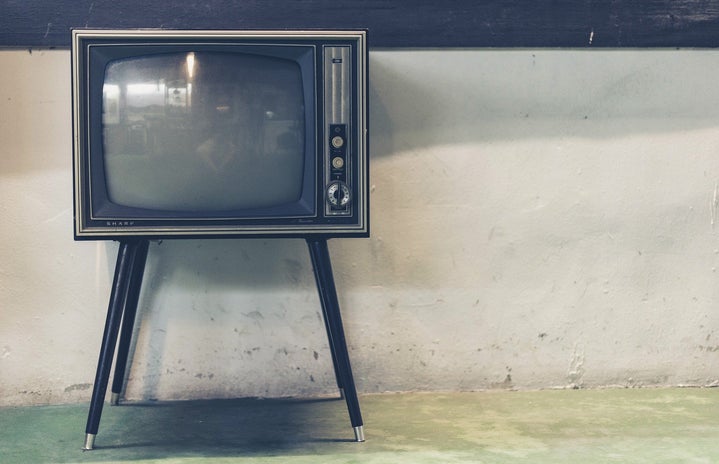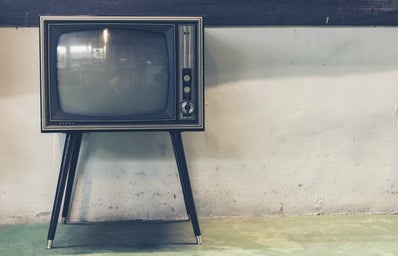There was a time in my life, not too long ago, where all I did was watch television. You could name any TV show and I had heard of it (and probably watched every season). It became my party trick. At the age of thirteen, adults and children alike would approach me to ask questions about a specific show or cast or subplot. This thirteen-year-old had the answers. Some people know every American president or an obsessive amount about sharks or the square root of 64. I know television.
After consuming nearly every show on both cable and streaming services, I began to narrow down my favorites. A pattern appeared: they were all from the early 2000s. As I was being born, the golden age of television arrived. In 2005 alone, The Office, Grey’s Anatomy, How I Met Your Mother, and It’s Always Sunny in Philadelphia began their epic careers as TV powerhouses. Even earlier than that, we had cult favorites for the turn of the millennium, like Friends (1994), Buffy the Vampire Slayer (1997), and Freaks and Geeks (1999). Most people are familiar with these shows, which is why I am hoping to divert attention to the lesser known shows of the early 2000s and unpack their significance.
Weeds (2005)
I firmly believe that if Weeds was released any other year than 2005 it would be as well known as Shameless or Parenthood. Instead, it was hidden amongst the other powerhouses of the year. Centered in a suburban California town, Nancy Botwin is a recent widow raising two young boys. She’s beautiful, clever, and sells marijuana. Her main clientele is suburban parents, but the show follows her rise in the business as she becomes increasingly criminal. At its core, Weeds is a family comedy-drama while also tackling the subjects of motherhood, femininity, and morality. Nancy Botwin is unlike any other leading lady. You never quite know whether she’s a good mother or a truly selfish individual.
Weeds is a fairly recent addition to my repertoire. I discovered it about a year ago as it felt like the world was ending. Nothing is quite as grounding an absurd TV show about a drug dealing mother. Running for eight seasons, Weeds is a time capsule of an era that felt like yesterday. The fashion is the epitome of early 2000s trends, Converse and low rise jeans in every scene. Marijuana is still illegal, which is crucial to the show’s plot. If the show was made today, Nancy Botwin wouldn’t find herself in jail so often. Because it takes place at the border of California, Weeds also address the issues of immigration and race. Nancy becomes engrossed in the Mexican drug trade during the later seasons, and gets away with more than she should because she’s a white woman. To top it all off, the number of George Bush jokes is hilarious. Weeds is a show that’s fully aware of itself and the current events of the 2000s. I’m not afraid to admit this is one of my favorite shows of all time. You can watch Weeds now on Netflix.

Smallville (2001)
The most wholesome TV show on my list is Smallville, the story of Superman. Before all the newfangled superhero shows on the CW, like Supergirl (2015) and Arrow (2012), there was Smallville. It stars the beautiful Tom Welling as young Clark Kent entering high school and just discovering his superpowers. Taking place in the heartland of America, Smallville centers on a tiny, rural town with strange townspeople that have a history of supernatural happenings. Technically, this show is catered to teenagers, but I truly believe anyone would find it enjoyable. Each episode features a new supernatural occurrence that only Clark Kent has the ability to solve. We see him become the Superman that is ingrained in everyone’s minds. Smallville is truly wholesome, old-fashioned fun. Perhaps you know the story of Superman, but this show still manages to keep you on your toes.
Of all my early 2000s watches, this is the most early 2000s. The soundtrack is the perfect indie rock compilation, including Avril Lavigne, Weezer, and Third Eye Blind. The fashion is quintessentially 2000s, sported by the famous Lana Lang, Clark Kent’s love interest. Smallville feels like a predecessor to shows like One Tree Hill (2003) and Friday Night Lights (2006). I watch this show when I need a break from reality; it’s the perfect escape. I can’t quite explain it, but I feel right at home in Smallville. I would not be surprised if it had the same effect on you. Do yourself a favor and watch one (or all) of its seasons on Hulu.

Ally McBeal (1997)
In a completely different vein, we have Ally McBeal, a weird little show that aired for five years. It is supposedly a “legal comedy-drama,” but I would say it’s more akin to a fever dream. The show centers on Ally McBeal, a twenty-something lawyer in Boston who starts work at a new firm. The boss at her new firm? Her ex-boyfriend and love of her life. At first glance, you would expect Ally McBeal to be a serious romantic drama about balancing career and love. It is anything but. The character of Ally McBeal is such an absurd person, I would argue her insane. The law firm she works at is run by similarly absurd characters who have funerals for frogs, get more things done in the unisex bathroom than their offices, and are all obsessed with Ally’s sex life. To this day, I am unsure if the creators of this show meant for it to turn out so strange. You would be shocked to learn how many internet memes have come from Ally McBeal episodes…
What I find most interesting about this show is it’s portrayal of women. It should be noted that most of the creative production was done by men, who arguably made Ally so quirky that she is almost unbearable for women to watch. But I think Ally McBeal is the perfect sign of its times. Ally is supposed to be viewed as an independent working woman who attempts to balance a career and a family. She is something else entirely. Similar to Sarah Jessica Parker’s character in Sex and the City, these working women claim to be independent when they actually spend every episode chasing after men. Not only is this a reflection of the men creating these shows, but it also a sign of transition. Women in television used to be accessories to men, and were often portrayed as comfortable in the role of housewife. The turn of the millennium brought the decline of this trope because of its political incorrectness. Shows were being created that centered entirely on the lives of women, exhibiting an independence that was previously unseen. Ally McBeal is one of those shows. Yet, authentic female independence was not accurately reflected because men still dominated the making of television. With more female creators in the later 2000s, true womanhood appeared on screen (i.e. The Mindy Project (2012), Girls (2012), and New Girl (2011)). For my generation that is curious about the world before political correctness, check out Ally McBeal on Amazon Prime.
These are my early 2000s picks that I would recommend to anyone. If the fashion and music are becoming trendy, why not throw in a TV show or two? Additionally, I would like to acknowledge some honorable mentions, which include Felicity (1998), Veronica Mars (2004), and Pushing Daisies (2007). Good television comes in waves and the turn of the millennium should be marked as one of the most prominent ones.




